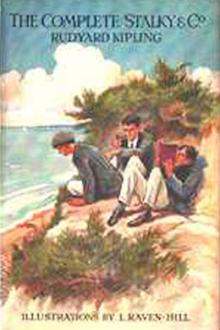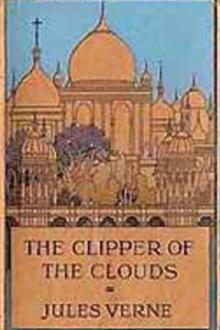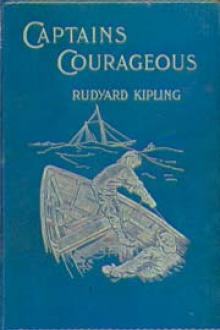Kim, Rudyard Kipling [best romance ebooks TXT] 📗

- Author: Rudyard Kipling
Book online «Kim, Rudyard Kipling [best romance ebooks TXT] 📗». Author Rudyard Kipling
“Look! Brahmins and chumars, bankers and tinkers, barbers and bunnias, pilgrims and potters—all the world going and coming. It is to me as a river from which I am withdrawn like a log after a flood.”
And truly the Grand Trunk Road is a wonderful spectacle. It runs straight, bearing without crowding India’s traffic for fifteen hundred miles—such a river of life as nowhere else exists in the world. They looked at the green-arched, shade-flecked length of it, the white breadth speckled with slow-pacing folk; and the two-roomed police-station opposite.
“Who bears arms against the law?” a constable called out laughingly, as he caught sight of the soldier’s sword. “Are not the police enough to destroy evil-doers?”
“It was because of the police I bought it,” was the answer. “Does all go well in Hind?”
“Rissaldar Sahib, all goes well.”
“I am like an old tortoise, look you, who puts his head out from the bank and draws it in again. Ay, this is the Road of Hindustan. All men come by this way...”
“Son of a swine, is the soft part of the road meant for thee to scratch thy back upon? Father of all the daughters of shame and husband of ten thousand virtueless ones, thy mother was devoted to a devil, being led thereto by her mother. Thy aunts have never had a nose for seven generations! Thy sister—What Owl’s folly told thee to draw thy carts across the road? A broken wheel? Then take a broken head and put the two together at leisure!”
The voice and a venomous whip-cracking came out of a pillar of dust fifty yards away, where a cart had broken down. A thin, high Kathiawar mare, with eyes and nostrils aflame, rocketed out of the jam, snorting and wincing as her rider bent her across the road in chase of a shouting man. He was tall and grey-bearded, sitting the almost mad beast as a piece of her, and scientifically lashing his victim between plunges.
The old man’s face lit with pride. “My child!” said he briefly, and strove to rein the pony’s neck to a fitting arch.
“Am I to be beaten before the police?” cried the carter. “Justice! I will have Justice—”
“Am I to be blocked by a shouting ape who upsets ten thousand sacks under a young horse’s nose? That is the way to ruin a mare.”
“He speaks truth. He speaks truth. But she follows her man close,” said the old man. The carter ran under the wheels of his cart and thence threatened all sorts of vengeance.
“They are strong men, thy sons,” said the policeman serenely, picking his teeth.
The horseman delivered one last vicious cut with his whip and came on at a canter.
“My father!” He reigned back ten yards and dismounted.
The old man was off his pony in an instant, and they embraced as do father and son in the East.
Good Luck, she is never a lady,
But the cursedest quean alive,
Tricksy, wincing, and jady—
Kittle to lead or drive.
Greet her—she’s hailing a stranger!
Meet her—she’s busking to leave!
Let her alone for a shrew to the bone
And the hussy comes plucking your sleeve!
Largesse! Largesse, O Fortune!
Give or hold at your will.
If I’ve no care for Fortune,
Fortune must follow me still!
The Wishing-Caps.
Then, lowering their voices, they spoke together. Kim came to rest under a tree, but the lama tugged impatiently at his elbow.
“Let us go on. The River is not here.”
“Hai mai! Have we not walked enough for a little? Our River will not run away. Patience, and he will give us a dole.”
“This.” said the old soldier suddenly, “is the Friend of the Stars. He brought me the news yesterday. Having seen the very man Himself, in a vision, giving orders for the war.”
“Hm!” said his son, all deep in his broad chest. “He came by a bazar-rumour and made profit of it.”
His father laughed. “At least he did not ride to me begging for a new charger, and the Gods know how many rupees. Are thy brothers’ regiments also under orders?”
“I do not know. I took leave and came swiftly to thee in case—”
“In case they ran before thee to beg. O gamblers and spendthrifts all! But thou hast never yet ridden in a charge. A good horse is needed there, truly. A good follower and a good pony also for the marching. Let us see—let us see.” He thrummed on the pommel.
“This is no place to cast accounts in, my father. Let us go to thy house.”
“At least pay the boy, then: I have no pice with me, and he brought auspicious news. Ho! Friend of all the World, a war is toward as thou hast said.”
“Nay, as I know, the war,” returned Kim composedly.
“Eh?” said the lama, fingering his beads, all eager for the road.
“My master does not trouble the Stars for hire. We brought the news bear witness, we brought the news, and now we go.” Kim half-crooked his hand at his side.
The son tossed a silver coin through the sunlight, grumbling something about beggars and jugglers. It was a four-anna piece, and would feed them well for days. The lama, seeing the flash of the metal, droned a blessing.
“Go thy way, Friend of all the World,” piped the old soldier, wheeling his scrawny mount. “For once in all my days I have met a true prophet—who was not in the Army.”
Father and son swung round together: the old man sitting as erect as the younger.
A Punjabi constable in yellow linen trousers slouched across the road. He had seen the money pass.
“Halt!” he cried in impressive English. “Know ye not that there is a takkus of two annas a head, which is four annas, on those who enter the Road from this side-road? It is the order of the Sirkar, and the money is spent for the planting of trees and the beautification of the ways.”
“And the bellies of the police,” said Kim, slipping out of arm’s reach. “Consider for a while, man with a mud head. Think you we came from the nearest pond like the frog, thy father-in-law? Hast thou ever heard the name of thy brother?”
“And who was he? Leave the boy alone,” cried a senior constable, immensely delighted, as he squatted down to smoke his pipe in the veranda.
“He took a label from a bottle of belaitee-pani (soda-water), and, affixing it to a bridge, collected taxes for a month from those who passed, saying that it was the Sirkar’s order. Then came an Englishman and broke his head. Ah, brother, I am a town-crow, not a village-crow!”
The policeman drew back abashed, and Kim hooted at him all down the road.
“Was there ever such a disciple as I?” he cried merrily to the lama. “All earth would have picked thy bones within ten mile of Lahore city if I had not guarded thee.”
“I consider in my own mind whether thou art a spirit, sometimes, or sometimes an evil imp,” said the lama, smiling slowly.
“I am thy chela.” Kim dropped into step at his side—that indescribable gait of the long-distance tramp all the world over.
“Now let us walk,” muttered the lama, and to the click of his rosary they walked in silence mile upon mile. The lama as usual, was deep in meditation, but Kim’s bright eyes were open wide. This broad, smiling river of life, he considered, was a vast improvement on the cramped and crowded Lahore streets. There were new people and new sights at every stride—castes he knew and castes that were altogether out of his experience.
They met a troop of long-haired, strong-scented Sansis with baskets of lizards and other unclean food on their backs, their lean dogs sniffing at their heels. These people kept their own side of the road, moving at a quick, furtive jog-trot, and all other castes gave them ample room; for the Sansi is deep pollution. Behind them, walking wide and stiffly across the strong shadows, the memory of his leg-irons still on him, strode one newly released from the jail; his full stomach and shiny skin to prove that the Government fed its prisoners better than most honest men could feed themselves. Kim knew that walk well, and made broad jest of it as they passed. Then an Akali, a wild-eyed, wild-haired Sikh devotee in the blue-checked clothes of his faith, with polished-steel quoits glistening on the cone of his tall blue turban, stalked past, returning from a visit to one of the independent Sikh States, where he had been singing the ancient glories of the Khalsa to College-trained princelings in top-boots and white-cord breeches. Kim was careful not to irritate that man; for the Akali’s temper is short and his arm quick. Here and there they met or were overtaken by the gaily dressed crowds of whole villages turning out to some local fair; the women, with their babes on their hips, walking behind the men, the older boys prancing on sticks of sugar-cane, dragging rude brass models of locomotives such as they sell for a halfpenny, or flashing the sun into the eyes of their betters from cheap toy mirrors. One could see at a glance what each had bought; and if there were any doubt it needed only to watch the wives comparing, brown arm against brown arm, the newly purchased dull glass bracelets that come from the North-West. These merry-makers stepped slowly, calling one to the other and stopping to haggle with sweetmeat-sellers, or to make a prayer before one of the wayside shrines—sometimes Hindu, sometimes Mussalman—which the low-caste of both creeds share with beautiful impartiality. A solid line of blue, rising and falling like the back of a caterpillar in haste, would swing up through the quivering dust and trot past to a chorus of quick cackling. That was a gang of changars—the women who have taken all the embankments of all the Northern railways under their charge—a flat-footed, big-bosomed, strong-limbed, blue-petticoated clan of earth-carriers, hurrying north on news of a job, and wasting no time by the road. They belong to the caste whose men do not count, and they walked with squared elbows, swinging hips, and heads on high, as suits women who carry heavy weights. A little later a marriage procession would strike into the Grand Trunk with music and shoutings, and a smell of marigold and jasmine stronger even than the reek of the dust. One could see the bride’s litter, a blur of red and tinsel, staggering through the haze, while the bridegroom’s bewreathed pony turned aside to snatch a mouthful from a passing fodder-cart. Then Kim would join the Kentish-fire of good wishes and bad jokes, wishing the couple a hundred sons and no daughters, as the saying is. Still more interesting and more to be shouted over it was when a strolling juggler with some half-trained monkeys, or a panting, feeble bear, or a woman who tied goats’ horns to her feet, and with these danced on a slack-rope, set the horses to shying and the women to shrill, long-drawn quavers of amazement.
The lama never raised his eyes. He did not note the money-lender on his goose-rumped pony, hastening along to collect the cruel interest; or the long-shouting, deep-voiced little mob—still in military formation—of native soldiers on leave, rejoicing to be rid of their breeches and puttees, and saying the most outrageous things to the most respectable women in sight. Even the seller of Ganges-water he did not see, and Kim expected that he would at least buy a bottle of that precious stuff. He looked steadily at the ground, and strode as steadily hour after hour, his soul busied elsewhere. But Kim was in the seventh heaven of joy. The Grand Trunk at this point was built on an embankment to guard against winter floods from the foothills, so that one walked, as it were, a little above the country, along





Comments (0)